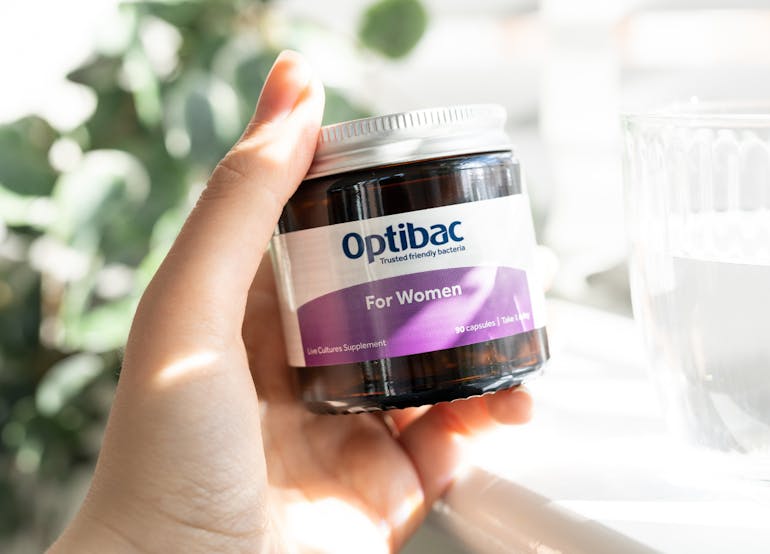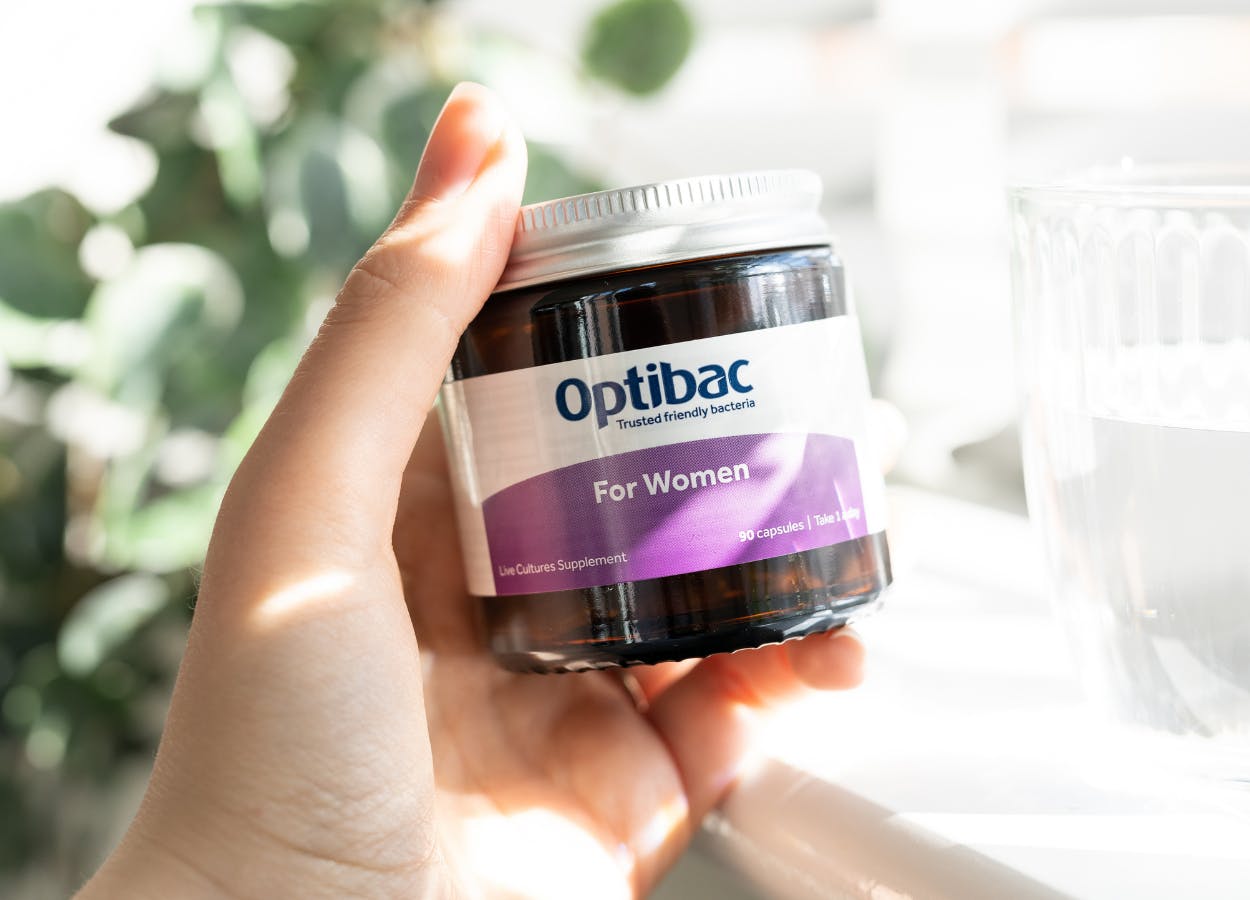What are the best probiotics for women?
Reviewed and fact-checked by Giulia Guerrini, Superintendent Pharmacist. Read our editorial policy to see how we create informative, accurate content.
Probiotics, found naturally in the body and in foods, are live infection-fighting microorganisms (how cool is that?). They’re found in your gut, mouth, vagina, urinary tract, skin, and lungs, and offer tons of health benefits. Probiotics are normally used to help with gut issues, but for women, they can also help with a wide variety of things, including vaginal health and pregnancy support.
Read on to find out more about probiotics and what they can do for women, as well as some examples of where to find probiotics in food and supplements.
What are probiotics?
Probiotics are live bacteria and yeasts that live throughout your body that are mostly found in your digestive tract. There are over 100 trillion of these friendly, good bacteria found in your body, and their main job is to keep all the bad bacteria in check while supporting your health. Known for helping your body with loads of important daily functions, probiotics are key for gut health among both men and women.
Other benefits of probiotics include helping to boost your mood, supporting weight loss, and fighting colds and flu. But with there being different probiotic types, it’s been found that some strains are more beneficial in supporting women’s health.
What are the benefits of probiotics for women?
For something so small, probiotics sure do offer a ton of benefits and support our bodies in a lot of ways. For women’s health specifically, probiotics don’t just help with gut and digestive problems; they also help with vaginal health and fertility, and can protect women from common infections.
Promoting gut and digestive health
One of the main things probiotics are known to help with is maintaining a healthy gut. Since probiotics are found in your gut, it’s no surprise that they help to restore your gut when the bacteria has been disrupted by an illness. Eating a healthy diet and fiber-rich foods helps your gut, but sometimes it’s not enough. Probiotics, like Proven Probiotics Acidophilus & Bifidus with Digestive Enzyme, have been shown to help with digestion issues and maintain a healthy gastrointestinal tract. These benefits can mean help with bloating, irritable bowel syndrome (IBS), and any other stomach and gut issues. It’s also shown that there’s a relationship between your gut health and your mood, so having a happy tummy may boost your mood as well – win-win!
Supporting immunity
Probiotics are infection-fighting bacteria, so it’s no wonder that they don’t just treat and help specific issues and infections – they also help with our immune systems. We can all get run down and sick from time to time, whether it’s the cold, flu, or something else, and it all takes a toll on our immune systems. By increasing the infection-fighting bacteria, probiotics have been shown to support our immune system and make it harder for those harmful bacteria to win.
For more information, read our article on ‘Can gut health affect your whole body?'.
Reducing urinary tract infections
Urinary tract infections (UTIs, or cystitis) are common among women of all ages, and many women have suffered from a UTI at some point in their lives. It’s also very common to get recurring UTIs. Women are at a higher risk of developing a UTI than men since their urinary tract is shorter, but good news: probiotics can help reduce the risk of a UTI. Probiotics, such as Proven Probiotics Womens Lactobacillus Bifidus & Cranberry can replenish the vagina’s natural bacteria, as well as balance out of the bad bacteria causing the infection with good bacteria.
Promoting vaginal health
The vagina is an amazing self-cleansing organ, and there are a lot of natural, good bacteria inside the vagina to protect it (fact: the vagina actually contains more bacteria than anywhere else in the body). This good bacteria is there to outnumber the harmful bacteria, produce natural antibiotics to kill other bacteria from entering and produce a substance that stops bacteria from sticking to the vaginal walls.
Vaginas are also acidic and have a natural pH balance between 3.8 and 4.5 due to the bacteria strain called lactobacilli. This strain helps the vaginal pH stay at a normal level to keep the balance of healthy bacteria and prevents harmful microorganisms from growing and surviving. But many things can throw off and disrupt this pH balance, including antibiotics, contraceptive pills, spermicides, lubricants, and even semen. Throwing off the pH balance can result in infections such as bacterial vaginosis (BV) or thrush (vaginal yeast infection), giving you uncomfortable symptoms like itching, irritation, and abnormal discharge. Lots of women experience these infections at least once, and it’s incredibly common for infections to reoccur. They can even be influenced by the menstrual cycle. Probiotics, such as OptiBac Probiotics for Women, can help to balance this pH level and work to restore the good bacteria, keeping these common vaginal health problems from happening.
For more information, take a look at our blog, ‘Here’s why you should take probiotics for vaginal health’.
Fertility and pregnancy
Probiotics could also be really beneficial for women’s fertility and during pregnancy: by keeping not only your gut, immune system, and also vaginal health in check, you’re less likely to get infections that may affect your chances of getting pregnant, such as BV and UTIs. Probiotics, such as OptiBac Probiotics for Pregnancy, create and balance the healthy bacteria in the body – meaning that your vaginal microbiome will be working as it should and increasing your chances of conceiving, as well as supporting a healthy pregnancy.
For more about probiotics and pregnancy, take a look at our article, ‘Probiotics for women: health benefits you should consider'.
The best probiotics for women
Probiotics are naturally found in the body, and there are 3 main strains of probiotics that have different functions. Giving them a boost with probiotic-rich foods and supplements can help your good bacteria. But knowing the different types of probiotics helps in terms of knowing what area you want to focus on, and what foods and supplements you should be taking.
The types of probiotics
There are families of different probiotics but most of them come from these 3 main groups:
- Lactobacillus: This is one of the two main types of bacteria used in probiotics and is commonly used in fermented foods. Lactobacillus specious and strain also dominates the vaginal microbiota.
- Bifidobacterium: This is another widely used probiotic, and is shown to survive well in the digestive tract – making it a great oral supplement and in dairy foods.
- Saccharomyces boulardii: This strain is more of a yeast than a bacteria, and is commonly used in kombucha as well as supplements.
Probiotics in foods
There are a lot of probiotic-rich foods that you can eat to boost your gut bacteria. Some of these include:
- Yogurt
- Kombucha
- Kefir
- Sauerkraut
- Fermented Vegetables
Take a look at our article or other foods that you can eat to boost your immune system.
Probiotic supplements for women
For vaginal health, look for lactobacillus strains: these help to balance the vaginal microbes. For example, you can try OptiBac Probiotics for Women 14 Capsules. For overall and general gut health, lactobacillus strains help restore gut flora. For IBS, try strains of Saccharomyces boulardii and a probiotic with a combination of the lactobacillus and bifidobacterium strains. For gut health, take a look atLamberts Probioguard 60 Capsules. Probiotic liquids are becoming more and more popular. Check out one of our best sellers, Wild Nutrition Multi-Strain Biotic (General Living) 90 gms.
Probiotics can have a huge amount of benefits for everyone, but there are particularly tons of great results for women’s health and vaginal health. Having a good balance of gut bacteria can help with a variety of digestive problems, while also helping with UTIs and vaginal infections and promoting fertility.
Keen to try? Take a look at our range of probiotics to help you get on track for a healthy gut.


